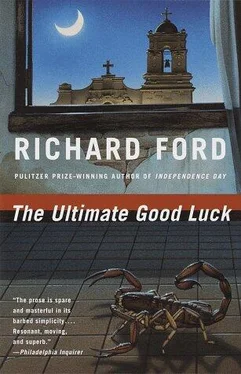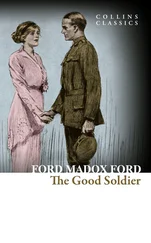“Are we going there?” Quinn said. The sight impressed him into silence.
“Sí,” Bernhardt said.
“My goodness,” Rae said, her face up to the seat back, watching.
“It is la casa de Señor Zago,” Bernhardt said. “And I only want to say,” he continued patiently, “that if you have a pistol, now you should not have it.”
“Why do you think I have one?” Quinn said. He tried to imagine how Bernhardt knew he had the gun.
“It will only cause you trouble,” Bernhardt said over the steering wheel, watching the dirt road carefully. “We do not want trouble now.”
He thought about the gun and the stupidity of not having it the moment he needed it, of the chance of seeing Deats and not having a gun then. The idea seemed funny, like the same stoned Ojibwas turning up again and again in the moonlight as if he’d come out but never been able to arrest them. He took the.38 out from between his skin and his belt band, put it in the glove box, and closed the plate. “Qué bueno,” Bernhardt said and grinned. “It will be there when we return.”
“What about me?” Quinn said. “Am I going to be here?”
“You too,” Bernhardt said. “My word is on it.”
Zago’s house was a long, flat-roofed arrangement of stucco and glass cubes. With bright lights on inside, all the rooms visible from the road appeared empty. The most intense light came from a high middle casino with a cantilevered roof that opened to the sky and oversaw the valley south to the foot of the mountains. The night stranded the house against the inching clouds, and there was no way to tell what was around it or how it was distinguishable in daylight.
Bernhardt drove to the back of the villa where the approach became brick paved and opened into a floodlit court and garage. “Is muy elegant house,” he said and smiled respectfully at Rae in the back seat.
“It looks like a convalescent home,” Rae said, but Bernhardt wasn’t listening.
What impressed Quinn outside was the absoluteness of the sky. It seemed to funnel light out of the courtyard and extinguish it like a blot over the rest of the world. There were no stars, and the moon had fallen below the roof of the villa and showed nothing. It made him feel precisely at the center of things, as though whatever was here had wicked the light out of the sky and focused it directly on him. Even with no gun, he felt competent and completely in control.
“Through the garage,” Bernhardt said.
A door opened in the back of the garage, and Quinn went toward it. A mustachioed man in a white shirt and white shoes stepped half into the doorway, then stood back for him to enter. “Left inside,” Bernhardt said softly from behind.
Inside the door was a narrow, half-lit corridor ending in another door thirty feet ahead. The air was oversweet, like a cheap men’s room. It was an attractive smell, a smell you always thought you knew. The mustachioed man led them twenty feet down the corridor, then stopped and turned, pointing a long nickel-plated.45 at Quinn’s mouth.
“No pistolas,” Bernhardt said breathlessly. The air around Quinn’s face felt suddenly congealed.
“Turn your back,” the man said softly. He flicked the gun muzzle up.
It wasn’t, Quinn thought, a threatening gesture. It was a businesslike gesture. The man didn’t seem to care. Quinn turned and put his hands over his head. Rae stared at him, her chin up, as though she expected him to say something funny. The Mexican laid the pistol below his hairline and frisked his pockets, then moved the gun to the small of his back and patted to his socks.
“If you had a gun he would shoot you now,” Bernhardt said from behind Rae.
Quinn could feel his heart slowing. He had the purest urge to lean on the gun, to come as close to it as he could.
The Mexican suddenly shoved the barrel hard against his spine. “La mujer,” he said.
Rae’s face changed oddly as if someone had stepped on her foot. She took off her glasses and pushed her hand back through her hair. “Why not?” she said and stepped past Quinn toward the Mexican and put her arms up.
The Mexican breathed audibly. He put the gun against Rae’s neck and snaked his hand under her arms and down her front, over her breasts, her stomach, in her crotch and out quickly. Quinn watched for the little hand to linger, to choose a place it liked best, but it moved too fast and treated all the parts it touched the same, as if what it was after lay in an altogether different geography from Rae’s.
The Mexican stepped to the side and pointed the gun at the door. “Ándale,” he said.
“Just like high school,” Rae said and turned toward the door.
The companionway opened directly into the high casino, which was large and elongated and sunk below the rest of the house, which led off into two softly lit corridors. The room had bright lights and a high cantilevered lucarne with opening machinery, and there were, Quinn noticed as he entered, long, heavy abstract paintings on all the walls. The paintings were bright acrylic and repeated one basic facial pattern in harsher and harsher distortions. The faces were female and ugly and static, like a design from another painter reproduced by a drugstore in sizes and colors to decorate anybody’s home.
A small blond woman in a purple dress was lying on a sofa with a night mask over her eyes. She seemed to be sleeping. The Mexican brought them down into the bright room, and the woman awoke startled and pushed up the mask, squinting in the light.
She was American. Quinn had seen her in the Portal, drinking gaseosas with street boys. He had heard her speak in English, and there was something about her he didn’t like. She was pretty and in her thirties and smiled too animatedly for the street boys, as if she liked thrilling them. Her features were small and delicate without makeup, and she seemed out of place with street boys.
“This is Señor Quinn,” Bernhardt said politely, distracted momentarily by the Mexican, who disappeared into the far corridor.
The woman blinked in the bright lights. She stared at Rae as if Rae’s presence in the room was something she didn’t expect.
“They are Americans,” Bernhardt said formally.
The blond woman reached for a cigarette in a glass bowl, and lit it. “What are you doing here?” she said. She examined the skirt of her purple dress, smoothed it, and blew smoke on it.
“It is business,” Bernhardt said briskly, then addressed Rae. “Señora Zago is an artista.” He gestured obligingly at the walls. “She is an expresionista. Correct?” he said.
Zago’s wife stared at Bernhardt and took a drag off her cigarette. “Close enough,” she said.
“Do you paint here?” Rae said. He knew Rae saw the woman had already singled her out, and was trying not to mind.
The woman slumped backward on the couch and held her cigarette out between her thin fingers. “The light’s no good here.” She looked disparagingly at her paintings. The face was her face. “Mexican light’s too flat.” She took another drag on her cigarette. “You don’t look like you’ve been enjoying yourself too much in Mexico,” she said.
“Señor Quinn has an amigo in the jail.” Bernhardt made jail sound like yell . “Don Luis perhaps can help them.”
“Why would he do that?” she said, staring at Rae again.
“Because he is generoso,” Bernhardt said confidently. A door closed down the corridor, and the Mexican’s rubber soles came squeaking on the tiles. Bernhardt glanced quickly at the entrance of the corridor. “He is generoso, no?” he said, looking back at Zago’s wife.
“Very generoso,” she said, and looked at Quinn for the first time. She seemed amused. “What did your friend do?” she said.
Читать дальше







![Theresa Cheung - The Dream Dictionary from A to Z [Revised edition] - The Ultimate A–Z to Interpret the Secrets of Your Dreams](/books/692092/theresa-cheung-the-dream-dictionary-from-a-to-z-r-thumb.webp)




